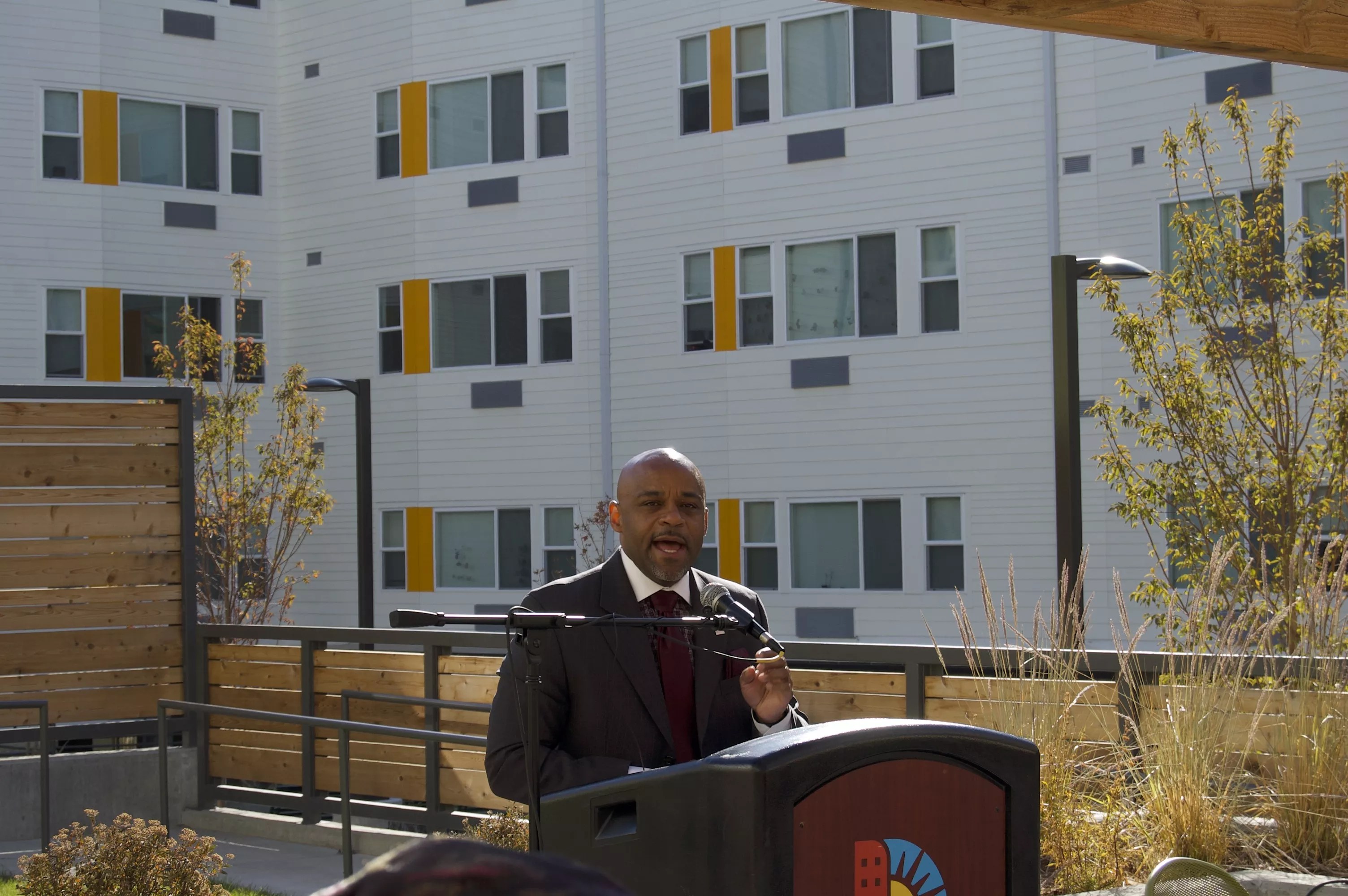
Sara Fleming

Audio By Carbonatix
The city has secured eleven new contracts with a set of nonprofit service providers as part of the first phase of a $15.7 million initiative to help combat homelessness with shelter upgrades and transitional housing support, Mayor Michael Hancock announced today, December 4.
Hancock had unveiled the initiative in April, when the urban camping ban, which was enacted during Hancock’s first term, became a hot topic in the municipal elections. Supporters of Initiative 300, which would have repealed that ban, cited several reasons that people experiencing homelessness are living on the streets instead of sleeping in shelters or finding homes: the skyrocketing price of housing, for example, as well as the difficulty of finding and accessing affordable housing while living in unstable environments, and numerous issues with the accessibility of Denver’s shelter system.
While announcing the details of the new service contracts, Hancock made a reference to those contentious times. “Last spring, as we approached a public’s vote on Initiative 300, and the challenges that the city was facing with regards to its homeless community and a need to do better, I was visited by a group of philanthropists and nonprofit leaders who said we recognize that the city cannot do this by itself, and we have to lean in more, so we’re going to push back on Initiative 300. We have to have a commitment to do better in the city of Denver,” he said.
The services announced today will expand the city’s funding for bridge housing programs, which provide temporary housing to stabilize people searching for permanent homes, as well as expand services, access and programming at Denver’s shelters during the daytime. The city has committed $11.2 million toward the three-year fund, and groups including the Anschutz Family Foundation, the Colorado Health Foundation, the Associated General Contractors of Colorado, the Downtown Denver Partnership and VISIT Denver have provided another $3.5 million. (The DDP and VISIT Denver were among the top donors to the campaign opposing Initiative 300.)
Five of the contracts are so large that they will have to go to Denver City Council later this month for approval.
The initiative’s efforts will be facilitated by the city’s new Department of Housing Stability, officially created in October to merge the city’s efforts on affordable housing (previously a project of the Department of Economic Development and Opportunity) and homelessness (previously the purview of Denver Human Services).
Denver’s bridge housing program, administered by the Colorado Coalition for the Homeless, currently provides 200 families annually with a temporary place to stay (such as a motel room or an apartment leased by the Coalition), generally for no more than 90 days, while they connect to permanent housing. The new funding will increase the number of families served by bridge housing programs from 200 to 620, and add Family Promise of Greater Denver as a partner in managing a new bridge housing program.
The city will also provide millions of dollars for capital improvements to shelters run by the Denver Rescue Mission, the St. Francis Center, Urban Peak and Volunteers for America, including expanding ADA access. It will also create 600 new storage units so that people can secure their belongings at Denver Rescue Mission shelter locations, and put millions toward increased daytime support services at all of those shelters, as well as the Salvation Army’s Crossroads Shelter.
Shelters have traditionally been places for people to take refuge in extreme weather conditions, or overnight on a regular basis. But increasingly, they’ve also become spots where people experiencing homelessness can access services designed to help them transition into housing, such as case management, behavioral health services and help accessing basic needs. The funding announced today includes $100,000 toward capital expenses and $528,405 toward supportive services at the new Volunteers of America women’s shelter, which will become the city’s first 24-hour shelter; it will serve up to 25 women who are either veterans or over the age of 54.
Homeless advocates have repeatedly pointed out that because of problems with access to shelters, most serve only a limited population. “We know that there are reasons why individuals, couples and families hesitate to seek shelter in our current system, and we want to address those head on,” Britta Fisher, the executive director of the Department of Housing Stability, said at today’s announcement. “We know that can include a lack of storage for personal belongings, limited hours of service, services and programs needed outside of the shelter that are not available on site. They may not feel safe, or physically cannot access the building or all of its services and need access to basics such as restrooms and showers. These are critical needs, pointed out by organizations and advocates and the people with the lived expertise.”